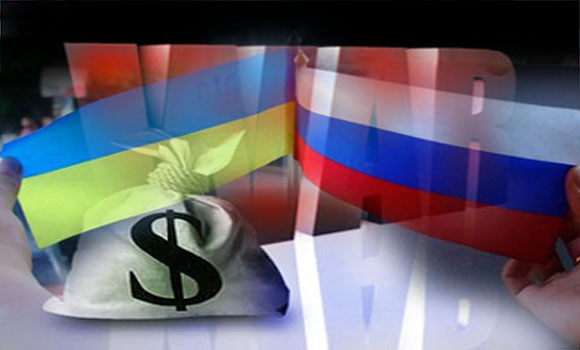Dmitry Babic
The recent events in Eastern Ukraine bring back a lot of tragic memories to both Russians and Ukrainians, especially those who still remember the World War II, which was indeed the Great Patriotic War for both of our nations. For the first time after a 70-year-long hiatus we hear shells exploding, artillery thundering and bombs falling in this part of Ukraine. The last time this area was a scene to military action was in 1943-1944, during the battle for the region of Donbass – once one of the most cherished territorial gains of Hitler in the former Soviet Union, valued for its steel and coal.
Who is instigating this absurd battle, in which representatives of the two indeed fraternal nations – Russians and Ukrainians – are taking part? It is clear that the Ukrainian army was unwilling to start this so called “anti-terrorist operation” and it remains reluctant to conduct it. Ukrainians revealed themselves to be excellent warriors during World War II (at least three of the most renowned Soviet marshals during that war were of Ukrainian origin). Ukrainians would certainly do a short work out of any foreign invader, had he seized any of their towns, in the east or in the west of their country. So, why is the army unwilling to fight? Because the army is an offspring of the people, and this war is not a war of the people. Rather, it is most obviously a war of politicians, and not even Ukrainian politicians.
Most interestingly, one can notice a certain vile link between war and money, usually made by Western strategists: “Ukrainians, you will get your money, if only you fight the Russians.” Of course, there are all sorts of nice euphemisms to avoid making that offer look too crude. But what is the meaning of the following quote from an IMF staff report, quoted in a number of publications in Asia and Europe? “Should the central government lose effective control over the east, the program will need to be redesigned,” the AFP quotes the IMF report as saying.
A “redesign,” in the IMF language, basically means one thing – you will get no money (or much less than you expected). So, the government in Kiev, whose legitimacy is already in deep doubt, is pushed into waging one more “antiterrorist operation” with the use of tanks, artillery and aviation against the citizens of Ukraine. (Even Western television could not resist the professional obligation to show the heartbreaking images of unarmed civilians trying to stop tanks on their way to the besieged towns in Eastern Ukraine).
Money for war, or power – for war and nothing less. Because the legitimacy (and in this way, the power) of the unelected government in Kiev depends largely on its ability to get the money from the West.
Who can derive satisfaction from such things? There is just one person, who does it publicly and unabashedly – former National Security advisor to president Jimmy Carter, Zbigniew Brzezinski. In his interview to The American Interest, given shortly after president Vladimir Putin started his operation in Crimea, Brzezinski hinted that Finns had a good life after WWII because they resisted Stalin’s attack in 1939-1940. Ukrainians, in Brzezinski’s opinion, could do likewise – if they fight a war against Russians. One can explain this phenomenon by Brzezinski being what a prominent Polish publicist Adam Michnik called him – “an American patriot with a hot Polish heart.” Epochs and regimes live a life of their own in Mr. Brzezinski’s mind: Russia is still Stalin’s Soviet Union, corrupt and disorganized 21st century Ukraine is actually disciplined, protestant Finland under general Gustav Mannerheim, etc.
It could be comic, if it had not been tragic. Let us not forget that it was Brzezinski who talked President Carter into starting a program of arming Afghan mujahideen in 1979-1980. Later that program backfired against the US, when Osama bin Laden and other terrorists turned American weapons against those who made them.
The former US ambassador to Afghanistan and a long-time opponent of the Soviet presence in that region, Zalmay Khalilzad, also suggested “arming those forces in Ukraine which are capable of resisting the Russian occupation of the east of that country.” There is little doubt that the US is already following the disastrous advice of this distinguished cold warrior, who had the dubious “honor” of serving as the US ambassador in Iraq in the 2000s, when blood was flowing like a river in that unhappy country. Both in Iraq and Afghanistan (and now in Ukraine) the pro-American leaders of those countries were promised short-term loans and long-term economic prosperity – in exchange for war NOW. A war against their own people.
The nightmarish careers of Brzezinski and Khalilzad seem set to get their continuation in Ukraine. Hopefully, this will not be a revival – or at least, a very short revival of neo-conservative thinking. It is time not just for Russians, Ukrainians and the people of the Middle East, but also for Americans to understand – wars do not bring economic prosperity.
Actually, wars never helped anyone. Dialogue did – but it is precisely the dialogue that both the EU and the US rejected in the story with Ukraine. First, in November 2013 they rejected president Yanukovych’s offer to have trilateral talks between Kiev, Brussels and Moscow. This happened late last year, when Yanukovych voiced a modest desire to have the association agreement with the EU postponed (not even canceled). Second, the EU and the US rejected dialogue with the protesters in the east of Ukraine, dismissing them as “pro-Russian separatists” and urging Kiev to do the same. An unwise “money for war” policy, with all-too-well-known results.


